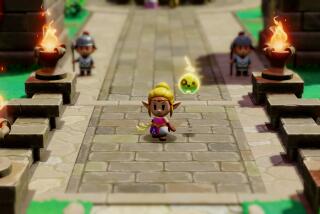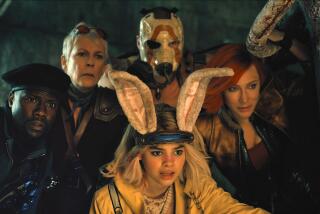The Player: 2014 Games: There was ugliness, but diversity won
The following column was originally published last December. This week, citing threats of violence, organizers canceled two panels related to harassment and the gaming industry planned for next year’s South by Southwest conference in Austin, Texas.
One of the most unforgettable video game characters of 2014 was a princess and one whose name most Americans would recognize: Snow White.
Only this version of Snow White isn’t exactly similar to the royal in fairy tales of yore. A star of Telltale Games’ “The Wolf Among Us,” this Snow White is a tough, no-nonsense New Yorker.
The Snow of “The Wolf Among Us” is a rarity in video games, in part because she’s a woman and in part because Telltale has crafted a game in which Snow’s every word can send the player into a second-guessing headache.
LIST: Todd Martens’ best video games of 2014
Snow also couldn’t have come at a better time.

Much of the past year in gaming was marred by a quasi-Internet-driven movement known as “gamergate.” The phrase was almost immediately associated with violent, social-media-driven comments directed at female game developers and writers, namely those who dared to speak out about the boys club that has long been the video game medium. Gamergate is convoluted, but it’s driven by a fear that criticizing games for misogyny or a lack of social awareness will result in a politically correct makeover of the medium.
“The Wolf Among Us” was just one of 2014’s many games that proved the gamergate cause wrong. Having even a smidgen of diversity — in this case a fully realized female character — did nothing but make “The Wolf Among Us” stronger. This is a game, after all, in which sex workers are mutilated, but the presence of Snow presented a much-welcome counterpoint to the big, bad, gruff playable character Bigby. It also added a little sexual tension to the plot.
But Snow brought a lot more than gender balance to “The Wolf Among Us,” a game inspired by Bill Willingham’s myths-in-exile comic “Fables.” Snow is a by-the-book government employee who’s opposed to the very thing video games too often rely upon: violence as a solution to nearly every problem. Keeping Snow from expressing disappointment becomes the biggest, most challenging fight in the game, where one wrong phrase — or one clenched fist — can cost the player her respect.
In a narrative-driven format in which forming an emotional connection with the characters is paramount, Snow challenges players to approach the game in non-game-like fashion. Here, words become a primary weapon, and Snow is always looking over our shoulder — or hovering in our memories — testing us to avoid a violent confrontation.
Snow wasn’t the only female character this year to make a lasting impression.
A number of 2014’s most exciting games, from mobile title “Monument Valley” to indie action game “Transistor,” are led by women. Red, the star of “Transistor,” is a vigorous singer who was wronged and left for dead. She shreds her nightgown, arms herself with a sword and seeks to regain her past life.
“Never Alone” stars a bullheaded adolescent who steps out on a quest to save her Alaskan village. “Framed,” a slickly animated live-action comic, splits the difference between a male and female thief. The latter always has the upper hand, and she also receives a show-stopping train-jumping scene. That says nothing of the tenacious Amanda Ripley of “Alien: Isolation.”
LIST: Todd Martens’ best video games of 2014
There’s good news too, as at least some publishers appeared clued in to the idea that gamers today, despite the gamergate howls, want more diversity. Take “Until Dawn,” an upcoming horror game starring Hayden Panettiere. An early glimpse of the game shows her in a towel — a potential victim, depending on player choices — but Supermassive Games executive Will Byles said he wants to make a game his 16-year-old daughter will be proud of.
“We’re very conscious of not making some sort of sexist, misogynist backward-looking trope,” he said.
That means no phallic-like slasher film attacks, and the game is split with four male leads and four female leads. All can end up dead or alive.
“We’re definitely working in the zeitgeist,” Byles said.” That old-fashioned misogynist attitude is very dated. It goes on — I’m not saying it doesn’t — but it doesn’t feel contemporary, and audiences today will not stand for it.”
No, as indie studio Drinkbox learned when it released indie title “Guacamelee!” It was the rare North American game to explore a Latin American culture but was also criticized for featuring a damsel-in-distress plot. It was meant, said studio co-founder Graham Smith, as a parody of “Super Mario Bros.”
“But by parodying something you are perpetuating it,” he reflected after the complaints.
The studio’s next game, “Severed,” stars a woman with a tragic past. The criticism against “Guacamelee!” was “legitimate,” Smith said, and while “Severed” wasn’t a reaction, per se, the studio is using the game to explore nonconventional themes of family and death. “We’re trying,” he said, “to be part of the solution and no longer part of the problem.”
So if 2014 goes down as “The Year of Gamergate,” maybe in the end that’s a positive. For exposing the ugly underbelly of gaming culture showed everyone that there are better, deeper and more diverse stories to be told.
More to Read
The biggest entertainment stories
Get our big stories about Hollywood, film, television, music, arts, culture and more right in your inbox as soon as they publish.
You may occasionally receive promotional content from the Los Angeles Times.











